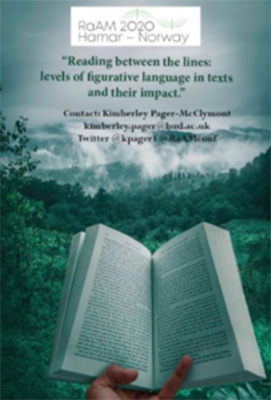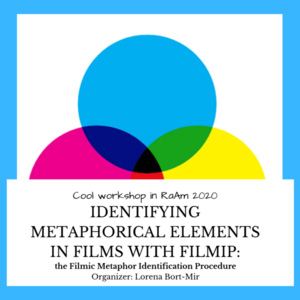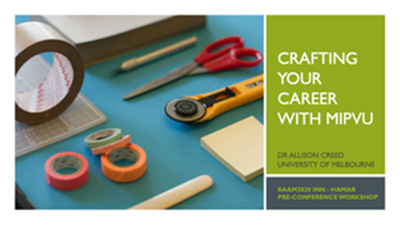Our conference workshops are now fully booked. Those of you who have indicated that you would like to join one or more of them will be notified via email about which workshop(s) you have been accepted to. The workshop convenors will also be sent a list of participants with contact email addresses.
All workshops took place on 18 June 2020.
The workshops
(1) Reading between the lines: Levels of figurative language in texts and their impact
 Kimberley Pager-McClymont (University of Huddersfield, UK)
Kimberley Pager-McClymont (University of Huddersfield, UK)
Held on 18 June 2020 12:20-14:20 (UTC +2)
“Emotions are the core of Literature. Every character, every story written has a purpose: to create a reaction” (Brown: 1962, p.122). Communicating emotion in a way that conveys universal understanding is a challenge: do we all feel the same spectrum of emotions? This is why figurative language is overly used in literature, as it allows authors to convey emotions in a clear, objective way.
“Verbal narration [...] draws on figurative language, particularly metaphors. Often on the page what is internal to a character comes out in metaphorical language” (Abbott: 2008, p. 118). Figurative language can take shape in varied ways and has a multitude of usage, all with different impacts. The term “metaphor” is often used as a general term to refer broadly to figurative language and other techniques. All figurative language techniques have a similar purpose: to convey meaning through visualisation. Yet not all figurative language techniques are created equal to fulfil this purpose, and different techniques can be extremely specific, such as personification or anthropomorphism. Despite this fact, most imagery techniques are defined in similar terms, despite their varied outcome.
With this workshop, participants will sharpen their knowledge of specific imagery techniques, particularly their impact on emotion communication and characterisation.
The workshop will be sectioned into different activities:
- Introduction and key concepts presented (20min).
- Textual example 1: general analysis of a text to discuss the theory presented (30min).
- Textual example 2: analysis and discussion – participants will be given two texts. They will analyse the figurative language used and discuss how it impacts the plot. Ideally the two texts will be compared and contrasted to observe differences in uses of imagery techniques (30min).
- Drawing game: A text will be read to the participants who will be asked to draw what they hear. The results will be compared to the same activity done by a group of school children to observe how professionals and children perceive and interpret figurative language differently. (30min).
- Conclusion and general discussion of the workshop (20min).
Requirements for participation: No requirement necessary, handouts of the slides and the text will be given to participants.
Special technical requirements: Access to a computer with the possibility of a PowerPoint presentation + blank paper
About the organizer - Kimberley Pager-McClymont:
Kimberley Pager-McClymont is a third-year PhD candidate in Linguistics (Stylistics) at the University of Huddersfield and a secondary school English teacher. She focuses on the impact of figurative language in texts, particularly how it impacts communicating emotions in narratives and how it contributes to characterisation overall. Her PhD thesis is centred around pathetic fallacy, a specific type of metaphor without a linguistics model. Read more about Kimberly Pager-McClymont here.
References:
- Abbott, H. P. (2008). The Cambridge Introduction to Narrative (2nd ed.). Cambridge: Cambridge University Press.
- Brown, C. (1962) ‘Towards a Definition of Romanticism’, in Burnshaw, Stanley (ed.), Varieties of Literary Experience, New York: New York University Press.
- Culpeper, J. (2001). Language and characterisation: People in plays and other texts. Harlow: Longman.
- Kövecses, Z. (2002). Metaphor: A practical introduction. New York: Oxford University Press.
- Lodge, D. (1992). The Art of Fiction: Illustrated from Classic and Modern Texts. London: Penguin.
(2) Identifying metaphorical elements in films with FILMIP: The Filmic Metaphor Identification Procedure
 Lorena Bort-Mir (Universitat Jaume I, Castellón, Spain) - RaAM 2020Virtual - To be held on
Lorena Bort-Mir (Universitat Jaume I, Castellón, Spain) - RaAM 2020Virtual - To be held on
18 June 2020 10:10-12:10 (UTC +2)
The study of cinematic metaphors is recently receiving much interest among scholars from different fields of study such as discourse analysts, linguists, or even cognitive psychologists. It is precisely this emerging concern what has emphasized the need of an empirical method designed for the identification of these tropes in filmic materials. FILMIP’s reliability and validity tests (Bort-Mir, 2019) show that the method offer consistent results among independent analysts. The seven-step procedure, interdisciplinary in nature, can be seen as the dynamic version of VISMIP (Šorm & Steen, 2018) but with key modifications to adapt the method to the complexity and requirements of multimodal artifacts.
The aim of this workshop is to illustrate FILMIP, and to apply and discuss the method with some TV-commercials to be analyzed in groups by the participants.
The workshop will be divided into 3 stages:
- The first 30 minutes will be devoted to the description of FILMIP’s seven steps through the illustration of one analysis.
- During the following 60 minutes, participants will be asked to apply the procedure in groups with two pre-selected TV-commercials.
- A general discussion on the results will take place within the last 30 minutes of the workshop. The materials under analysis may prompt debates about the communicative function of metaphors in filmic advertising, the role of communicative modes in the triggering of filmic metaphors, or the creative vs. non-creative (or conventional) side of metaphors in persuasive genres. Nonetheless, the key point for the discussion will be the strengths and limits of the procedure according to the experience of the participants, and also the possible existence of culture-specific and genre-specific interpretations.
Participants can project the commercials in their mobile phones and proceed with their analyses using the handouts that will be provided to them by the organizer.
About the Lorena Bort-Mir
Lorena Bort-Mir, PhD is an associate professor and researcher at Universitat Jaume I, within the English Studies Department. She is interested in multimodal metaphor analysis and metaphor processing in films. She developed FILMIP (Filmic Metaphor Identification Procedure) in her thesis. She published articles and papers in several journals, and she has been invited as keynote speaker in various international conferences and workshops.
(3) Crafting your career with MIPVU
 Allison Creed (University of Melbourne, Australia)
Allison Creed (University of Melbourne, Australia)
To be held on 18 June 2020 08:00-10:10 (UTC +2)
What does career mean to you? How can metaphors help you in crafting your career? Why do metaphors matter to your career planning? The objective of this workshop is to provide a practically oriented and personally relevant introduction to an analytical rather than intuitive approach to metaphor identification: The Metaphor Identification Procedure Vrije Universiteit (Steen et al., 2010). MIPVU is presented as a faciliatory resource for career guidance to increase self-awareness and enhance decision making.
The workshop will articulate a step by step adapted version of MIPVU (see Creed & Nacey, 2019) for participants to apply to case study examples in English and Norwegian. Participants will then utilise the META4 Career cards to create their own mini narratives and apply MIPVU to analyse their personal metaphor/s to conceptualise their target topic—education, career, or transition. The workshop will conclude with a discussion of potential implications of metaphor choices on career planning.
This introductory methods workshop is suitable for participants at any stage of their academic or professional career. Knowledge of MIPVU is not required although participants with existing skills may find this a novel way to reflect on their current career plan. Participants require an internet enabled devise e.g., laptop, iPad, smart phone, etc.
About Dr Allison Creed
Dr Allison Creed is a Curriculum Designer, Faculty of Arts, at the University of Melbourne with research and teaching expertise in Education, Marketing, and Applied Linguistics. She is a Researching and Applying Metaphor Executive Committee member (Conference Secretary), research team member of the University of Southern Queensland ACCELL and collaborates with the Inland Norway University of Applied Sciences Faculty of Education and Metaphor Lab Amsterdam team.
Her research utilizes metaphor analysis to focus on issues in Higher Education, Career, and Wine Marketing. Allison also has experience in cross-disciplinary teaching in blended and online undergraduate and postgraduate courses on- and off-shore. Read more about Allison Creed here.


